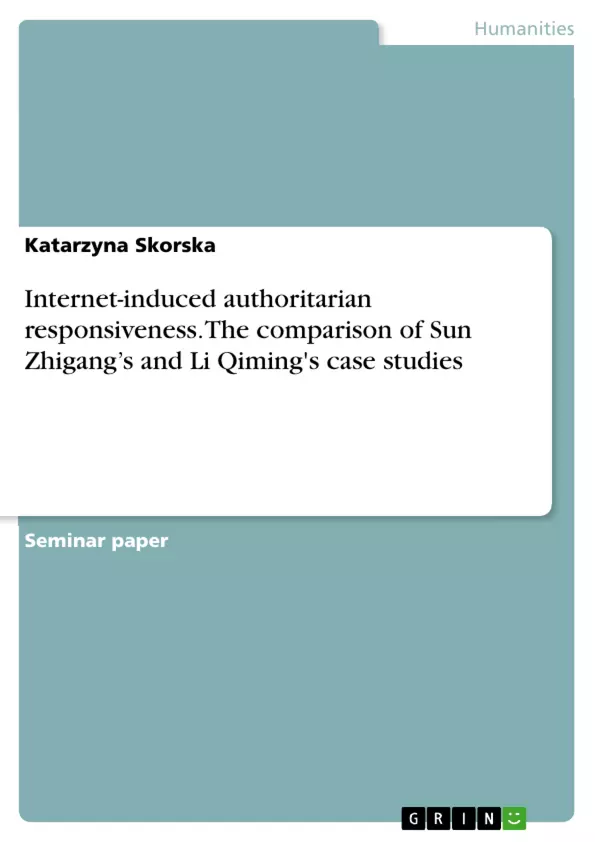The main thesis of this study is that the cause of Internet-induced authoritarian responsiveness (as in the cases of Sun Zhigang and Li Qiming) is the necessity to maintain the Party’s legitimacy. Both those issues cover social problems that pose a big problem for China.
The state by responding to them and accommodating the citizen's demands, reinforces its legitimacy. Drawing on the crucial terms and notions for this study (authoritarian responsiveness, internet-induced, and legitimacy), this work will present step by step, after defining key terms one after another, how they connect to create a new term- internet-induced authoritarian responsiveness. First, I will explain authoritarian responsiveness and the different types of it that some research is pointing at.
Then this study will shortly present crucial points for the understanding of (Chinese) state legitimacy. Next, I will Illuminate the
never-ending “mouse-and-cat” game between China’s sophisticated censorship and the Netizens, who are being named “the new opinion class”. After that, I will present two case studies of Sun Zhigang and Li Qiming and show how they are exemplary instances of the above-mentioned terms and the social issues that they represent.
Inhaltsverzeichnis (Table of Contents)
- 1. Introduction
- 1.1. Research Question and Methodology
- 1.2. Literature Review
- 1.3. Ethical Issues
- 2. Authoritarian Responsiveness
- 3. Party's Legitimacy
- 4. Virtual China
- 5. The Case Studies of Sun Zhigang and Li Qiming
- 3.4. The Case of Sun Zhigang
- 3.5. The Case of Li Qiming
- 6. Conclusion
Zielsetzung und Themenschwerpunkte (Objectives and Key Themes)
This study aims to examine the phenomenon of internet-induced authoritarian responsiveness in China, focusing on the cases of Sun Zhigang and Li Qiming. It explores how the Chinese government's responses to online public opinion contribute to maintaining the Party's legitimacy.
- Internet-induced Authoritarian Responsiveness
- The Role of Online Public Opinion in Authoritarian Regimes
- Maintaining the Party's Legitimacy in China
- Case Studies of Sun Zhigang and Li Qiming
- The relationship between online dissent and government response
Zusammenfassung der Kapitel (Chapter Summaries)
Chapter 1: Introduction introduces the research question and methodology, providing a background on the relationship between internet use, authoritarian regimes, and the maintenance of legitimacy. It briefly discusses the existing literature.
Chapter 1.1: Research Question and Methodology outlines the study's approach, explaining the connection between authoritarian responsiveness, internet influence, and the Party's need for legitimacy. It details the methodology used for analyzing the chosen case studies.
Chapter 1.2: Literature Review surveys existing research on authoritarian responsiveness and legitimacy in China, highlighting relevant studies and identifying gaps in the current literature on internet-induced responsiveness.
Chapter 1.3: Ethical Issues addresses ethical considerations related to the chosen case studies.
Chapter 2: Authoritarian Responsiveness defines and categorizes authoritarian responsiveness, examining different forms and types, including citizen-initiated and state-initiated responses.
Chapter 3: Party's Legitimacy discusses the importance of legitimacy for the Chinese Communist Party and explores how the Party seeks to maintain its rule.
Chapter 4: Virtual China delves into the dynamics of internet censorship and online public opinion in China, focusing on the role of netizens.
Chapter 5: The Case Studies of Sun Zhigang and Li Qiming presents detailed case studies of Sun Zhigang and Li Qiming, highlighting their significance in understanding internet-induced authoritarian responsiveness.
Schlüsselwörter (Keywords)
Internet-induced authoritarian responsiveness, Chinese Communist Party, legitimacy, online public opinion, censorship, case studies, Sun Zhigang, Li Qiming, authoritarian regimes, digital activism.
- Quote paper
- Katarzyna Skorska (Author), 2024, Internet-induced authoritarian responsiveness. The comparison of Sun Zhigang’s and Li Qiming's case studies, Munich, GRIN Verlag, https://www.hausarbeiten.de/document/1508658


